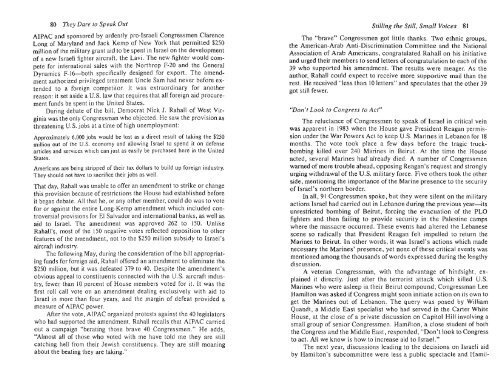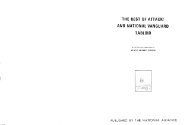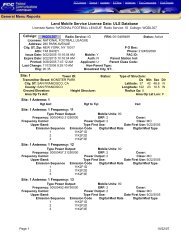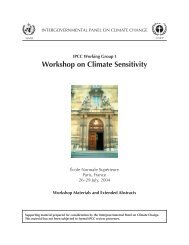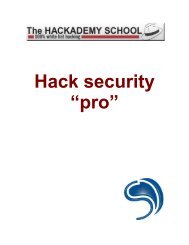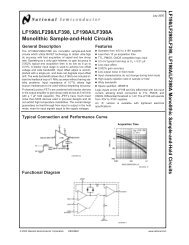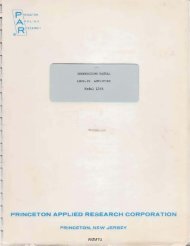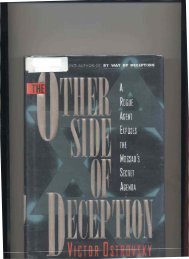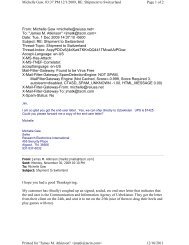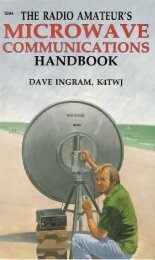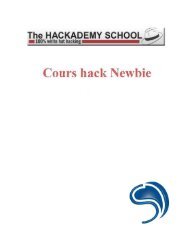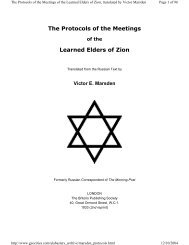They Dare to Speak Out
They Dare to Speak Out
They Dare to Speak Out
Create successful ePaper yourself
Turn your PDF publications into a flip-book with our unique Google optimized e-Paper software.
80 <strong>They</strong> <strong>Dare</strong> <strong>to</strong> <strong>Speak</strong> <strong>Out</strong><br />
AIPAC and sponsored by ardently pro-I sraeli Congressmen Clarence<br />
Long of Mar yland and Jack Kemp of New York that permitted $250<br />
million of the military grant aid <strong>to</strong> be spent in Israel on the development<br />
of a new Israeli fighter aircraft, the Lavi . The new fighter would compete<br />
for international sales with the Northrop F-20 and the General<br />
Dynamics F-16-both specifically designed for export. The amendment<br />
authorized privileged treatment Uncle Sam had never before extended<br />
<strong>to</strong> a foreign competi<strong>to</strong>r. It was extraordinary for another<br />
reason: it set aside a U.S. law that requires that all foreign aid procurement<br />
funds be spent in the United States.<br />
During debate of the bill, Democrat Nick 1. Rahall of West Virginia<br />
was the only Congressman who objected. He saw the provision as<br />
threatening U.S. jobs at a time of high unemployment:<br />
Approximately 6,000 jobs would be lost as a direct result of taking the $250<br />
million out of the U.S. economy and allowing Israel <strong>to</strong> spend it on defense<br />
articles and services which can just as easily be purchased here in the United<br />
States.<br />
Americans are being stripped of their tax dollars <strong>to</strong> build up foreign industry.<br />
<strong>They</strong> should not have <strong>to</strong> sacrifice their jobs as well.<br />
That day, Rahall was unable <strong>to</strong> offer an amendment <strong>to</strong> strike or change<br />
this provision because of restrictions the House had established before<br />
it began debate. All that he, or any other member, could do was <strong>to</strong> vote<br />
for or against the entire Long-Kemp amendment which included controversial<br />
provisions for El Salvador and international banks, as well as<br />
aid <strong>to</strong> Israel. The amendment was approved 262 <strong>to</strong> 150. Unlike<br />
Rahall's, most of the 150 negative votes reflected opposition <strong>to</strong> other<br />
features of the amendment, not <strong>to</strong> the $250 million subsidy <strong>to</strong> Israel's<br />
aircraft industry.<br />
The following May, during the cons ideration of the bill appropriating<br />
funds for foreign aid, Rahall offered an amendment <strong>to</strong> eliminate the<br />
$250 million, but it was defeated 379 <strong>to</strong> 40. Despite the amendment's<br />
obvious appeal <strong>to</strong> constituents connected with the U.S. aircraft industry,<br />
fewer than 10 percent of House members voted for it. It was the<br />
first roll call vote on an amendment dealing exclu sively with aid <strong>to</strong><br />
Israel in more than four years, and the margin of defeat provided a<br />
measure of AIPAC power.<br />
After the vote, AIPAC organized protests against the 40 legisla<strong>to</strong>rs<br />
who had supported the amendment. Rahall recalls that AIPAC carried<br />
out a campaign "berating those brave 40 Congressmen." He adds,<br />
"Almost all of those who voted with me have <strong>to</strong>ld me they are still<br />
catching hell from their Jewish constituency. <strong>They</strong> are still moaning<br />
about the beating they are taking."<br />
Stilling the Still, Small Voices 81<br />
The "brave" Congressmen got little thanks. TWo ethnic groups,<br />
the American-Arab Anti-Discrimination Committee and the National<br />
Association of Arab Americans, congratulated Rahall on his initiative<br />
and urged their members <strong>to</strong> send letters of congratulation <strong>to</strong> each of the<br />
39 who supported his amendment. The results were meager. As the<br />
author, Rahall could expect <strong>to</strong> receive more supportive mail than the<br />
rest. He received "less than 10 letters" and speculates that the other 39<br />
got still fewer.<br />
"Don't Look <strong>to</strong> Congress <strong>to</strong> Act"<br />
The reluctance of Congressmen <strong>to</strong> speak of Israel in critical vein<br />
was apparent in 1983 when the House gave Pre sident Reagan permission<br />
under the War Powers Act <strong>to</strong> keep U.S. Marines in Lebanon for 18<br />
months. The vote <strong>to</strong>ok place a few days before the tragic truckbombing<br />
killed over 240 Marines in Beirut. At the time the House<br />
acted, several Marines had already died. A number of Congressmen<br />
warned of more trouble ahead, opposing Reagan's request and strongly<br />
urging withdrawal of the U.S. military force. Five others <strong>to</strong>ok the other<br />
side, mentioning the importance of the Marine presence <strong>to</strong> the security<br />
of Israel's northern border.<br />
In all, 91 Congressmen spoke, but they were silent on the military<br />
actions Israel had carried out in Lebanon during the previous year-its<br />
unrestricted bombing of Beirut, forcing the evacuation of the PLO<br />
fighters and then failing <strong>to</strong> provide security in the Palestine camps<br />
where the massacre occurred. These events had altered the Lebanese<br />
scene so radically that President Reagan felt impelled <strong>to</strong> return the<br />
Marines <strong>to</strong> Beirut. In other words, it was Israel's actions which made<br />
necessary the Marines' presence, yet none of these critical events was<br />
mentioned among the thousands of words expressed during the lengthy<br />
discussion.<br />
A veteran Congressman, with the advantage of hindsight, explained<br />
it directly. Just after the terrorist attack which killed U.S.<br />
Marines who were asleep in their Beirut compound, Congressman Lee<br />
Hamil<strong>to</strong>n was asked if Congress might soon initiate action on its own <strong>to</strong><br />
get the Marines out of Lebanon. The query was posed by William<br />
Quandt, a Middle East specialist who had served in the Carter White<br />
House, at the close of a private discussion on Capi<strong>to</strong>l Hill involving a<br />
small group of senior Congressmen. Hamil<strong>to</strong>n, a close student of both<br />
the Congress and the Middle East, responded, "Don't look <strong>to</strong> Congress<br />
<strong>to</strong> act. AIl we know is how <strong>to</strong> increase aid <strong>to</strong> Israel."<br />
The next year, discussions leading <strong>to</strong> the decisions on Israeli aid<br />
by Hamil<strong>to</strong>n's subcommittee were less a public spectacle and Hamil-


